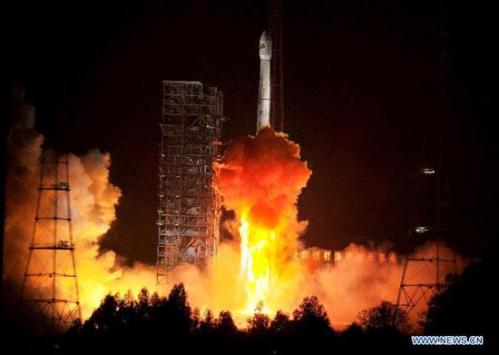China has successfully sent Bolivia’s first satellite into space from the southwestern Xichang Satellite Launch Center. The rocket blasted off at 0:42 a.m today. The communication satellite is named after Tupac Katari, an indigenous Bolivian leader who fought against Spanish colonial rule.
Three years of hard work finally pays off. With the help of China’s Aerospace Technology, Bolivia’s first telecommunication satellite was sent into orbit. During his state visit to China, Bolivian President Evo Morales came to witness the launch process.

A Bolivian communications satellite is launched from the Xichang Satellite
Launch Center(XSLC), southwest China's Sichuan Province, Dec. 21, 2013.
China successfully sent a Bolivian communications satellite into orbit
with its Long March-3B carrier rocket at 0:42 a.m.(Beijing Time) Saturday.
(Xinhua/Yan Yan)
"The launch of our first telecommunication satellite has significant meaning to the Bolivian People. So through this state visit to China, I first met with the Chinese President on bilateral relations, then I came to witness this historical moment myself." said Evo Morales, President of Bolivia.
The satellite, to be operational in March 2014, aims to strengthen Bolivia’s broadcast communications, distance education and healthcare services. The satellite has a life expectancy of 15 years. The successful launch of this kind of commercial satellite also means a lot for China’s Aerospace Industry.
"Besides the telecommunication satellite projects, we also developed remote-sensing satellites and other commercial satellite projects. China is willing to share its aerospace technology with other countries and hopes more people will enjoy the benefits." said Xu Dazhe, General Manager, China Aerospace Science and Industry Corp.
This has been China’s sixth telecommunication satellite exported to international clients. And Bolivia’s President also hoped to cooperate with China again on the country’s second satellite to monitor its natural resources in the next few years.
This satellite project is seen as the highlight of China and Bolivia’s high-tech cooperation. It will benefit millions of Bolivian people, and boost economic ties between the two countries.